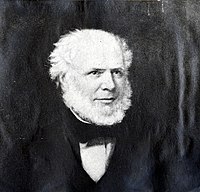Joseph Gillott
Joseph Gillott | |
|---|---|
 Portrait of Joseph Gillott. | |
| Born | 11 October 1799 Sheffield, England |
| Died | 5 January 1872 (aged 72)[1] |
| Resting place | Key Hill Cemetery |
| Known for | Pen maker |
| Children | Joseph junior |
Joseph Gillott (11 October 1799 – 5 January 1872) was an English pen-maker and patron of the arts.
Pen manufacturing

For some time he was a working cutler in his home town Sheffield, but in 1821 he moved to Birmingham, where he found employment in the steel toy trade, the technical name for the manufacture of steel buckles, chains and light ornamental steel-work generally.
About 1830 he turned his attention to the manufacture of steel pens by machinery, establishing its own company, Joseph Gillott's in Birmingham, which still produces nibs nowadays.
Art interests
Gillott was a liberal art-patron, and one of the first to recognize the merits of J.M.W. Turner. He died in Birmingham and was buried in Key Hill Cemetery.[2] His collection of pictures, sold after his death, realized £170,000. A white marble bust of Gillott stands in the main foyer of Birmingham Council House, and may be viewed by members of the public.
The family home for many years was 'The Grove' on Westbourne Road in Edgbaston and this was where Joseph junior grew up. In later years, Gillott (jnr) purchased a vast estate in the village of Catherine-de-Barnes, Solihull on which he built New Berry Hall, a large gothic mansion with North and South Lodges. He also built the school in the village.
References
- ^ "The Times Newspaper". 11 October 2007. Retrieved 11 October 2014.
- ^ Official Guide to the Birmingham General Cemetery, E H Manning, Hudson & Son, Livery Street, Birmingham, 1915. Birmingham Public Libraries (Reference, Local Studies, B.Coll 45.5)
- This article incorporates text from a publication now in the public domain: Chisholm, Hugh, ed. (1911). "Gillott, Joseph". Encyclopædia Britannica (11th ed.). Cambridge University Press.
